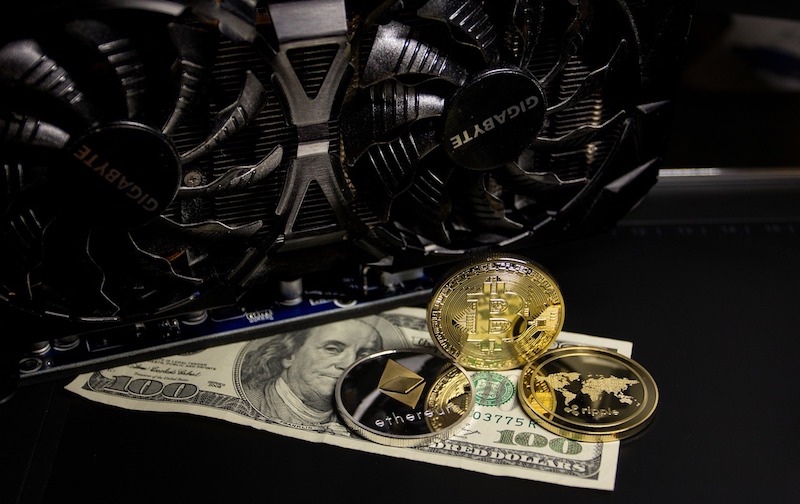This article was first published on Dollars and Sense
You’ve probably seen ads on Facebook and Carousell selling cryptocurrency mining rigs. The skeptic in you might immediately raise the red flag and ask: “If [insert cryptocurrency here] mining is so profitable, then why aren’t these sellers using these machines for themselves? It must be a scam!”
Before we explore that question, here’s a quick primer on what mining exactly is so we’re all on the same page.
How does cryptocurrency mining work?

We wrote previously about the differences between blockchain technology and cryptocurrencies.
In essence, rather than depending on an authoritative third-party (like a bank) for transactions, the validity of cryptocurrency transactions is ensured by many decentralized computers on the blockchain network reaching a consensus (by checking the cryptographic signatures).
Once there is a set number of valid transactions from the network, the entire block of transactions is added to the permanent ledger, forming a chain.
For a healthy blockchain network, it is important that no one person or group controls the majority of the computing power of in the network.
The beauty and genius of Bitcoin and its derivatives is the way people are incentivized to contribute computational resources to the blockchain network. New coins are generated (or “mined”) by finding a cryptographic solution (think of it like factoring a huge number) to a puzzle that includes results from previous blocks. This means there is no way to pre-calculate answers for a future block, and that all the computers on the network are competing for the same reward every time.
So, if you provide one percent of the computing resources in a coin’s blockchain network, the law of averages mean that over time, you should expect to find the cryptographic solution (and receive the reward) for one percent of the blocks.
As Bitcoin and other cryptocurrencies grew (or should we say, exploded) in price and popularity, the number of miners also increased. Add the fact that increasingly sophisticated and purpose-built machines are being used, each miner’s contribution to the overall computational power of the network has fallen drastically — and with it, their chances of receiving the block reward.
Beyond a certain point, the chances of a single miner getting the block reward approaches zero, and miners would be better off buying TOTO. Mining pools are a response to this, where groups of miners work together to increase their chances of getting a payout, which is distributed to members of the pool.
What determines mining profitability?

Here are some of the factors that determine whether it is even profitable to get and operate a mining machine.
Electrical consumption
Operating something as computationally intensive as mining 24/7 takes a lot of power. Some of these units consume more than ten times the power of ordinary PCs. With the immense heat generated, electricity is also needed for cooling — running fans/air-conditioning/water-cooling pumps.
Cost of electricity
This is the cost of electricity you use, which is more or less fixed, based on where you are in the world.
Timeframe
How long do you expect to be mining? Obviously, after you invested sunk costs like buying mining rigs, the longer you mine, the more profitable you should become. But how will things look a year or two from now? Will the coin you’re mining still retain its value? How many miners do you think will be on the network (and hence, how difficult will it be to get a reward)?
Coin value
Because prices of cryptocurrencies fluctuate so violently, you should make both a conservative (worse case) estimate as well as a rosy one. The conclusion of whether it is profitable to mine really depends on what you believe is going to happen, which isn’t very scientific, unfortunately.
So why don’t builders use the computers for themselves?

Not their area of interest/expertise
To be clear, there are companies that do design and build custom machines to use themselves rather than sell to others. But leaving them aside, computer builders sell you rigs because their expertise and business are in designing and building machines. They may have no interest in maintaining rooms or warehouses filled with mining rigs, monitoring them round the clock, worrying about price fluctuations, and guessing which coin yields the best difficulty-reward ratio.
Costs of mining might be higher for them
In Singapore, space is really costly, and so is electricity. The computer geeks may not be able to get low prices on space and electricity. Even though the math may not work for them, it might for their customers, who may already have real estate to house their mining machines or plan to operate them overseas.
Uncertainty regarding profitability
As you can see in the previous section, many of the factors that determine mining profitability are completely unpredictable — namely, the future price of the cryptocurrency being mined, and the number of machines taking part in the network at any point in time.
For a business, such uncertainty is really risky. People who build mining rigs may not want to take the risk that mining will be profitable over the long run, and rather capitalize on the very real demand today for these machines by crypto enthusiasts wishing to strike it rich.
If you want to get your hands on some coins but mining isn’t your thing, you could always just buy Bitcoins or alternative coins with cash.
DollarsAndSense.sg is a website that aims to help people make better financial decisions. If you like what you read, subscribe to the Dollars And Sense Newsletter.





Reader Interactions